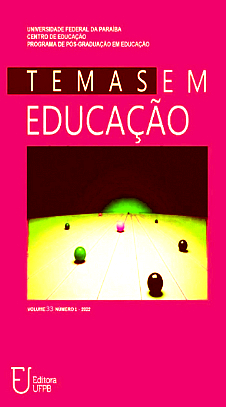HEARTS… AT SCHOOL: LOVE IN STUDENT EVERYDAY LIFE
amor em cotidianos estudantis
DOI:
https://doi.org/10.22478/ufpb.2359-7003.2024v33n1.68358Keywords:
Love and Youth, School, Education, Cartography, HeartAbstract
Love permeates lives in different ways. Through the attention mobilized by the author – who is a teacher and researcher – to the hearts that permeate the school, photographic and written records were made during about a year of research-teaching. In school spaces, in addition to bigger curricular knowledge, one also learns to coexist and relate to others in an artisanal way, and it is precisely these processes of subjective production and creation of other curricula that this text focuses on. The hearts written on tables, walls, windows and school doors, in love letters, on posters and in notebooks are the protagonists in the creation of writing-encounters in cartographies, inspired by the possibilities of autofiction and poeticizing the encounters and lived paths.
Downloads
References
AZZOLIN, M. A. N.; BARCELOS, V. H. de L. A busca pelo caminho do amar: o SER e o FAZER na docência. Quaestio – Revista de Estudos em Educação, Sorocaba, v. 24, 2022.
BARROS, M. Poesia Completa. São Paulo: Leya, 2010.
BEI, A. Pequena coreografia do adeus. 1. ed. São Paulo, Companhia das Letras, 2021.
BLANCO, S; CAMPANELA, E; CONCÍLIO, V. A Autoficção: uma engenharia do eu. Urdimento: Revista de Estudos em Artes Cênicas, Florianópolis, v. 3, n. 48, p. 1–18, 2023.
CARDOSO, L. R.; PARAISO, M. A. Tecnologia de gênero e a produção de sujeitos no currículo de aulas experimentais de ciências". Currículo sem Fronteiras, v. 15, 2015, p. 155-177.
CARVALHO, D. F.; GUIDO, L. F. E.. Corações para além do biológico em processos de questionamento do mundo. Revista Observatório, Palmas, v. 4, n. 1, p. 115–130, 2018.
COCCIA, E. A Vida das Plantas: uma metafísica da mistura. Florianópolis: Cultura e Barbárie Editora, 2018.
DELEUZE, G.; GUATTARI, F. Mil platôs: Capitalismo e esquizofrenia. Vol. I. 2. ed. São Paulo, Ed. 34. 2019.
DELEUZE, G. Lógica do Sentido. Tradução: Luiz Roberto Salinas Fortes. São Paulo: Perspectiva; Ed. da Universidade de São Paulo, 1974.
FOUCAULT, M. História da Sexualidade I: a vontade de saber. 23. ed. Rio de Janeiro: Graal, 2013.
HAN, B-C. Sociedade do cansaço. Petrópolis: Vozes, 2017.
hooks, b. Tudo sobre o amor: novas perspectivas. Tradução Stephanie Borges. São Paulo: Elefante, 2020.
LISPECTOR, C. Um sopro de vida: pulsações. Rio de Janeiro: Nova Fronteira, 1978.
ROLNIK, S. Amor: o impossível… e uma nova suavidade. Palestra apresentada em 1994 sob o título “O amor anda impossível?”. PUC – São Paulo: Núcleo de Estudos da Subjetividade, 1994.
ROLNIK, S. Cartografia Sentimental: transformações contemporâneas do desejo. Porto Alegre: Sulina, Editora da UFRGS, 2016.
ROLNIK, S. Esferas da insurreição: notas para uma vida não cafetinada. 2. ed. São Paulo: N-1 Edições, 2018.
SILVA, T. T.; CORAZZA, S. M.; ZORDAN, P. (org.). Linhas de escrita. Belo Horizonte: Autêntica, 2004.
SILVA, T. T. Documentos de identidade: uma introdução às teorias do currículo. Belo Horizonte: Autêntica, 2011.
Downloads
Published
How to Cite
Issue
Section
License
Copyright (c) 2024 Revista Temas em Educação

This work is licensed under a Creative Commons Attribution 4.0 International License.
Authors who publish in this journal agree to the following terms:
. Authors retain the copyright and grant the journal the right to first publication, with the work simultaneously licensed under the Licença Creative Commons Attribution that allows the sharing of the work with acknowledgment of authorship and initial publication in this magazine. . Authors are authorized to assume additional contracts separately, for non-exclusive distribution of the version of the work published in this journal (eg, publishing in institutional repository or as a book chapter), with acknowledgment of authorship and initial publication in this journal.
. Authors are permitted and encouraged to publish and distribute their work online (eg in institutional repositories or on their personal page) at any point before or during the editorial process, as this can generate productive changes, as well as increase impact and citation of the published work (See O Efeito do Acesso Livre).



















